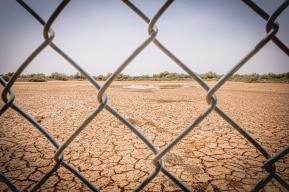On the occasion of World Press Freedom Day 2024, themed "A Press for the Planet: Journalism in the Face of the Environmental Crisis," emphasizing the fundamental role of journalism and reliable information in safeguarding our planet, it is essential to highlight the challenges environmental journalists face, particularly in conflict zones like Yemen. Amidst ongoing turmoil, Yemeni journalists continue to brave danger to report on crucial issues including the environmental crises affecting their country. To this end, UNESCO GCC and Yemen office highlights the essential work of Yemeni journalists through an interview with Mr. Hussen Nasser Al-Yabari, an environmental journalist at Holm Akhdar, an environmental foundation aimed at promoting awareness and public understanding of Yemen’s environmental challenges.
Yemen, already burdened by conflict, faces a myriad of environmental challenges. Over the past decade, climate change-induced natural disasters, including floods, cyclones, landslides, and droughts, have caused extensive damage in the country. Among the most pressing issues are several cyclones that have hit Yemen, resulting in severe damage to housing and infrastructure, the flooding of hundreds of hectares of agricultural land, the loss of thousands of tons of crops, and more, directly impacting the livelihoods of Yemenis. In November 2023, according to a UNFPA situational report, Cyclone Tej struck southern coastal areas of Yemen, affecting an estimated 100,000 households, including 3,000 pregnant women. Al-Yabari explains that these challenges have been exacerbated by conflict, as man-made disasters such as deforestation, unsafe pesticide use, oil spills, and poor waste management have increased, putting further pressure on the country’s resources. He adds “Yemen has faced several significant environmental challenges over the past year, exacerbated by ongoing conflict, worsening humanitarian, economic, and environmental conditions.”
Awareness of all aspects of the environmental crisis and its consequences is essential for peacebuilding. Journalistic work is crucial for this purpose, providing the public with reliable information, insightful analysis, and a comprehensive understanding of the issues directly affecting them. Sharing a success story, Al-Yabari says,
The biggest threat facing the people and the environment in Yemen was the Safer vessel oil tank, which has now been rescued. At Holm Akhdar, we raised awareness of this issue through campaigns and disseminated films and warnings via local and international media. Communities wouldn’t know about this threat unless we raised awareness and disseminated information about it.
Despite competing priorities in times of conflict, Al-Yabari stresses the importance of prioritizing environmental reporting. He argues that reporting on environmental issues during crises is crucial, as conflict exacerbates environmental degradation, which directly impacts the livelihoods of the population. He explains “We prioritize a strategic approach that balances urgency, impact, and the public’s need to know, reporting on crises that pose immediate threats to human health and livelihoods, such as water scarcity or toxic waste or oil spills. We link environmental issues with ongoing humanitarian stories, connecting dots between climate change, agricultural failure, and food insecurity.”

Challenges to reporting in conflict
Reporting on environmental crises amidst conflict and political instability presents numerous challenges. Journalists encounter significant hurdles in seeking and disseminating information on these issues, especially in a war-torn country like Yemen. According to the Yemeni Journalists Syndicate's first quarterly report of 2024, 17 cases of violations against media freedom were documented in the country during the first quarter of the year. These violations included restrictions on freedom, assaults on journalists and press institutions, and property confiscations.
In addition to dealing with physical, economic, political, psychological, digital, and legal threats, accessing reliable information in times of crisis can be challenging. Al-Yabari explains, “As the conflict has strained resources, including fuel, electricity, and internet connectivity, journalists face difficulties in gathering data, conducting interviews, and transmitting reports. Power outages and limited access to technology impede timely reporting.” To navigate these hurdles, Al-Yabari emphasizes the importance of building relationships with local communities, collaborating with trusted journalists, and utilizing secure communication channels. He notes that conflict leads to an increase in the spread of misinformation, making fact-checking essential in combating disinformation and ensuring accurate reporting.
We always aim in our reporting to play a crucial role in raising awareness and influencing policies. Despite the challenges, we believe that environmental journalism contributes to positive change in Yemen and beyond.








